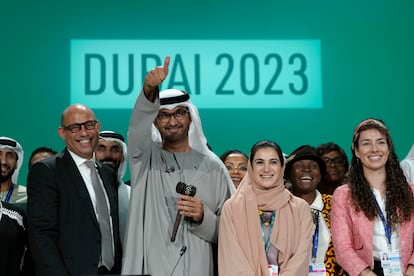Historic climate agreement
The Dubai summit points out a path that seemed impossible to travel: the end of oil, coal and gas

It has taken 30 years of climate summits and environmental mobilizations to reach an agreement that points the way to the end of the era of fossil fuels. After days of struggle, the document agreed upon by the almost 200 countries gathered at the Climate Summit (COP28) held in Dubai contains, for the first time, an explicit mention of the need to transition away from oil, coal and gas, the main causes of climate change. Until now, the emphasis had been placed on reducing greenhouse gas emissions, while ignoring the fact that fossil fuels are what cause them. Previous attempts to agree on their phase-out had failed at the Glasgow and Sharm el-Sheikh summits. Finally, a less forceful term has been imposed, but the final pact represents a clear defeat of countries like Saudi Arabia or Iraq, which, as the visible faces of oil interests — Russia did it in a sibylline way — have fought to prevent the now condemned fossil fuels from being mentioned, or at least to have them mentioned ambiguously.
This is a historic agreement to the extent that it proposes “transitioning away from fossil fuels in energy systems in a just, orderly and equitable manner” and “accelerating action in this critical decade” to achieve net zero emissions in 2050. The statement is very important because it sends a clear message to the financial system, to industry, to investors and to all types of public and private organizations about how they should guide their policy decisions from now on.
The result is better than what had been expected at the beginning of the summit, held paradoxically in a petrostate. There were attempts to divert attention towards proposals for technological solutions, such as the defense of carbon capture techniques that many countries insisted on. This technology — which involves separating the CO2 emitted by industrial activities and transporting it to a geological storage place to isolate it from the atmosphere — can still be useful in industries such as metallurgy, but not, for example, in electrical industries, where renewables are a cheaper alternative. In any case, carbon capture is by no means the solution to global warming.
As the president of COP28, Sultan al-Jaber, said at the presentation, “an agreement is only as good as its implementation,” something that now depends on each country adopting the agreed objectives of gradually phasing out the use of fossil fuels and the public aid they receive, in addition to tripling renewable energy capacity globally and doubling the global average annual rate of energy efficiency improvements by 2030. Everything will have to be specified in the new emissions reduction plans that each country must present within two years.
We have time to ensure that warming does not exceed 2.1 degrees since preindustrial times, although it is increasingly difficult to stay at the 1.5 degrees proposed in the 2015 Paris Agreement. This requires a firm political commitment to accelerate the decarbonization of the economy. With current emissions reduction plans, the average temperature is headed, in the best scenario, to increase between 2.1 and 2.8 degrees. The Dubai agreement is also a great achievement because a loss and damage fund has been approved to compensate the countries that are most vulnerable to climate change and to help them mitigate its effects, but now it must be complied with.
Sign up for our weekly newsletter to get more English-language news coverage from EL PAÍS USA Edition
Tu suscripción se está usando en otro dispositivo
¿Quieres añadir otro usuario a tu suscripción?
Si continúas leyendo en este dispositivo, no se podrá leer en el otro.
FlechaTu suscripción se está usando en otro dispositivo y solo puedes acceder a EL PAÍS desde un dispositivo a la vez.
Si quieres compartir tu cuenta, cambia tu suscripción a la modalidad Premium, así podrás añadir otro usuario. Cada uno accederá con su propia cuenta de email, lo que os permitirá personalizar vuestra experiencia en EL PAÍS.
¿Tienes una suscripción de empresa? Accede aquí para contratar más cuentas.
En el caso de no saber quién está usando tu cuenta, te recomendamos cambiar tu contraseña aquí.
Si decides continuar compartiendo tu cuenta, este mensaje se mostrará en tu dispositivo y en el de la otra persona que está usando tu cuenta de forma indefinida, afectando a tu experiencia de lectura. Puedes consultar aquí los términos y condiciones de la suscripción digital.









































